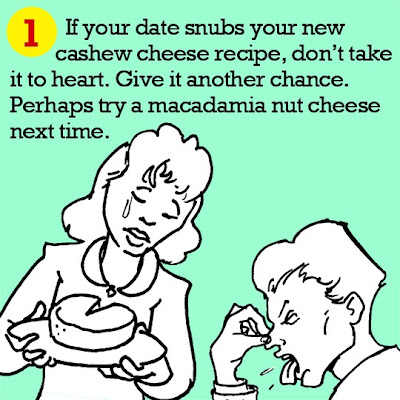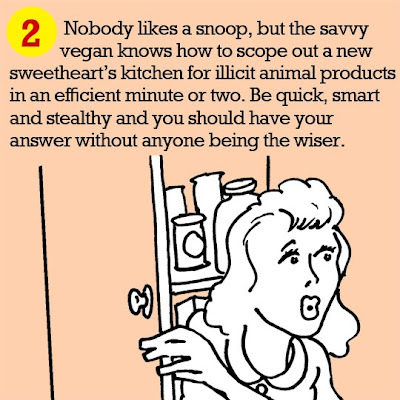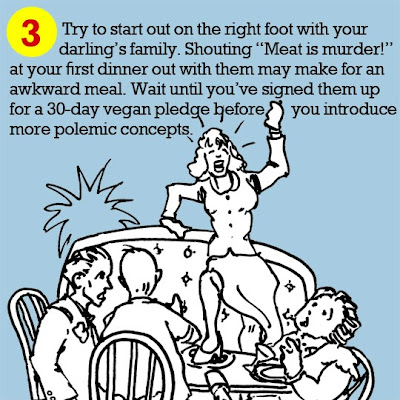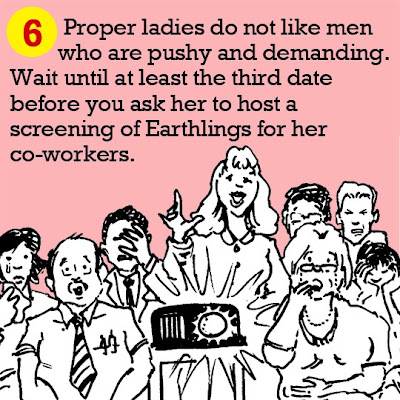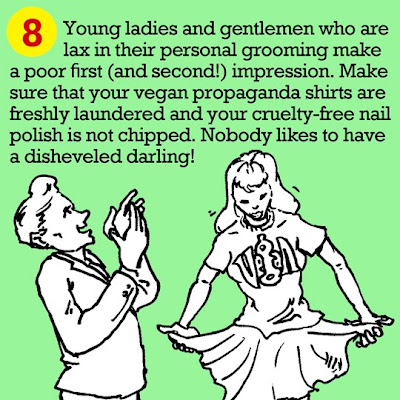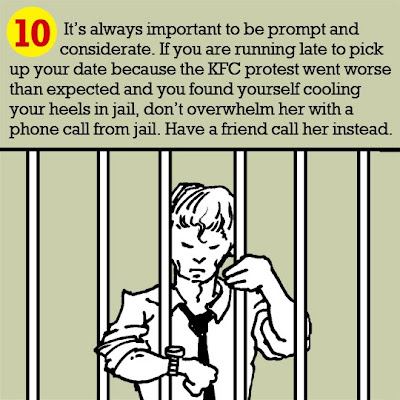Wednesday, August 28, 2013
Vegans Are Invincible and Other Dangerous Myths
I have a friend who is in the hospital with cancer. He’s a really nice guy, a friend to many, an honorary uncle to lots of children. It is not expected that he will live too much longer. It is an advanced, end-stage cancer, and it started somewhere else but it is now in the bone. It is a cancer that might well have had a different outcome had he gone to the doctor years ago, when he first started developing symptoms. There were multiple complicated and deeply challenging personal factors that kept him from seeking help from within a Western medicine protocol but now he has to, and the best we can really hope for is that the terrible pain and discomfort he kept (mostly) hidden for years is finally managed.
He is vegan.
Upon learning that he was sick, one of his relatives expressed a common sentiment, that he thought it was “ironic” that our friend was vegan and had cancer. I couldn’t help but wince upon hearing this. I know that one of the reasons my friend avoided medical help is that he didn’t want to be known as the sick vegan. He was supposed to be healthy: he was vegan, after all. Over the years, I have talked with other vegans who have also been sick, though not as dangerously so, and almost all kept it hidden for a potentially dangerous period of time, afraid of being exposed as a “failure” to their fellow vegans or having their illness exploited by others as proof that they were following a risky diet. They kept their illnesses and pain in secrecy, perhaps worsening something that was at one time minor, and they prolonged their physical and mental suffering. They became isolated, fearful and ashamed. In none of these cases, did veganism cause their illnesses, nor did it exacerbate it. In many cases, being vegan may improve the quality of their lives and their chances of recovery. The fact is, though, that they risked their mental, emotional and physical well-being because they didn’t want to expose themselves as ailing.
I’m here to state the obvious: vegans can and do get sick. We can and do develop painful, stubborn injuries. We are not always thriving and in perfect balance, and to claim otherwise is irresponsible and dishonest. What’s more, it can be life-threatening to those who would sooner suffer in secrecy - certain that they have failed as vegans, scared that exposure will make people draw unfair conclusions about veganism - when the simple truth is that none of us is invincible.
Every day, I see more and more far-fetched claims about veganism from a health perspective, presenting it as the ultimate magic bullet to unflagging wellness. Vegans do get cancer (less often, but still), we do get fibromyalgia, we do get aneurisms, and we can also break our legs, necks and so forth. These things happen. It’s nothing to be ashamed about, but, too often, we choose to live in isolation rather than risk exposing that we are mortal and vulnerable, just like everyone else.
This is very dangerous.
Veganism is a lifestyle that encourages compassionate living. Very often, there are real physical advantages to it, too, but perhaps this is overstated in our eagerness to win people over and to save more animals.
As R.D. Ginny Kisch Messina, co-author of Vegan for Her, wrote, “At any age, we vegans can expect that our compassionate diet has the added advantage of lowering our risk for certain diseases. But, vegan diets are not ‘miracle’ cures or guaranteed prevention and it’s a mistake to ever believe that they are. As always, the only true promise that comes with veganism is that it will remove your contribution to the use and abuse of animals.”
Health crises are frightening whether you are vegan or not, but adding to the immensity of it is the pressure to be a perfect physical representation of veganism. How many people suffer in silence and keep themselves awake at night, terrified not only about the lump that they found but that they will have to face additional and unfair scrutiny because they are vegan? How many people don’t seek medical help because they don’t want to have relatives tell them that “they told them so” about being vegan? How many people risk their well-being because they don’t dare “out” themselves as needing medical attention?
My friend is in the hospital now; he likely has anywhere from weeks to a few months to live. He will enter hospice soon. Veganism did not cause his cancer but his unwillingness to admit that he was unwell contributed to his avoidance of getting help when it could have most benefitted him. It also contributed to his isolation, anxiety and pain. If you are not well, please consider getting help. You are no benefit to the vegan cause if you are socially isolated and suffering, and, what’s more, you deserve to feel better for your own reasons. You did not fail veganism and veganism did not fail you. It happens. We are all imperfect, vulnerable beings and we are living in a world with many toxins. Please reach out to your support network and get the help that you need before it gets worse. Suffering in silence helps no one.
Wednesday, August 21, 2013
If She Didn’t Want to Get Raped, She Wouldn’t Have Been Made Out of Meat: The Language of Taking What is Not Ours
“For the master’s tools will never dismantle the master’s house.” ~ Audre Lord
There is a consistent mental gymnastics routine people will go through in order to justify the actions they take that don’t quite sit well with them but wish to continue to do anyway. While I don’t believe that the habit of eating animals is usually done to intentionally inflict suffering and harm, in the language around both sexual violence and consuming animals, there is crossover territory where what rapists take from those they victimize and what omnivores take from animals has a remarkably similar attitude of entitlement encompassing it. We can acclimatize ourselves to repeating some pretty self-serving notions, ones that most people would never accept if even a small detail (such as a female human for a female cow, or dog for chicken) were changed. In both rape and our role in oppressing animals, both can be framed as a birthright (“They were born for me to use as I wish,”) and as what is one’s due (“I spent money and this is what is owed me,”) and also presented in a way that completely belittles the experience of the victim (“Come on, don’t be so melodramatic; it wasn’t that bad.”). Only a sadistic psychopath would use such terms to justify violating another person, but we accept those terms without question on a daily basis involving the animals we consume. Underpinning both rape and eating animals, though, is the conceit that because we can do something, this confers the right to do it, no matter who is harmed or killed in the process.
“Simple: I saw it, I wanted it, so I took it.”
To my mind, eating animals is a feminist issue not only because so many of the horrors visited upon the animals are so often directly intertwined to our control of their reproductive agency – for example, the brutal insemination of dairy cows, hens and other animals – but also because when we adopt this framing of entitlement to another, we reinforce the language and, even more tragically, the mentality of rape. Of all people, shouldn’t feminists intuitively grasp this and make an effort to not be complicit in this fatal acquisition of another, justified by many simply “because I wanted to” and “because I can”? Isn’t this language chillingly rape-like? Don’t we learn as young children that this is not acceptable grounds for guiding our choices?
“I wanted it and that’s the only justification I need.”
As a young, awakening feminist in college, I was told time and time again that I was naive and silly because of my idealism. I am told the same thing today, as someone who is in her forties, someone who should have outgrown that first fervent desire to fix the world for the better long ago. I have always wanted to understand why those who are passionate liberationists at heart would participate in the oppression of another and it doesn’t feel particularly naive to be confused by this behavior. It is a disconnect: why shouldn’t this at least be acknowledged?
“I want what I want when I want it and I have the right to it.”
Maybe you are at a fundraiser for a progressive feminist organization at a beautiful hotel downtown. As a band plays in the background, you might easily see people spread cheese, something that you know is the product of rape, onto crackers. Instead of nursing from their mothers, the calves were taken from them and fed a factory-made formula. This is a formula designed to make the calves reach maximum growth as quickly as possible and to keep them from getting sick as long as possible so that they can be most profitable to those raising them for consumption. The male calves will be raised to become veal and cheap meat; the females will be born into the same cycle of forced impregnation, birth and lactation until they are less productive and also killed for cheap meat, just like the mothers they didn’t or only briefly suckled. You can be at this fundraiser while the speaker gives a moving speech about oppression, exploitation, violence and liberation, and the well-dressed benefactors may be eating cheese and slices of chicken, of pig and cow, all the while. They may applaud this speech and donate more money. This scenario is not at all uncommon and yet, when the rationalizations are removed, it is as in opposition to the brave, wild, inclusive and radically loving spirit of feminism as I can imagine.
You, as the vegan in the room, may feel farther and farther estranged from business-as-usual feminism as a result.
“If she didn’t want to be raped, she wouldn’t have worn that skirt.”
When I was twenty or so, I was walking home from a party by myself late at night and a stranger grabbed me, just like that. He was walking quickly toward me, a big guy, and I was well aware of him; I instinctively moved a bit to the side so he could pass. Behind me, though, he didn’t keep walking: instead, he grabbed me, twisting one arm behind my back as he put his hand over my mouth. Before I had a chance to react, he pushed me against a car. I thrashed against him, grabbing the handle of the car’s door with my free hand. I kicked and bit and did whatever my animal nature, in complete adrenaline mode, instructed me to do. He pulled me away from the car and I fell onto the grass; he pinned me down. I thrashed and hit - my hands were free now but his hand was still over my mouth (25 or so years later, I can still remember how that felt, the pads of his palm against my teeth) - and he reached up under my skirt and pulled my tights down to my knees. This is it, I thought. At that moment, an unseen door shut somewhere, a dog barked, something alarmed him, and he jumped up, running away. For about a block, insensibly, I chased after him, screaming, swearing, throwing my shoes. Nobody came outside; the people on that block probably thought I was just another drunk college student, fighting with my boyfriend. The next day, still reeling but uninjured and damn thankful for it, a friend took me to task for walking home by myself from a party and in a skirt. Other friends comforted me, sat with me as I filed the police report, talked to me late at night whenever I had an anxiety attack.
“If God didn’t want us to eat animals, He wouldn’t have made them out of meat.”
The animals we eat, whose value is only their worth to us, simply had to be born with flesh to be consumed, digested, forgotten. Their “products” the same. They have no friends or loved ones to comfort them. They have no police reports to file. They are blamed with a wink and a nudge for being “made out of meat.” Maybe, as they reach the end of the line, the hot smell of blood and terror everywhere, screams and bellows surrounding them, they think the same thing to themselves as I did before I was almost raped: This is it.
Eating animals is not a feminist act. In fact, it is deeply antithetical to the spirit of feminism. The beauty of it, though, is that within the promise of feminism, we have our solution: we can become the best we can be through the brave and bold practice of radical self-honesty.
Taking what doesn't belong to us is never kind, never progressive, never trail-blazing. Veganism is a profoundly feminist act.
Wednesday, August 14, 2013
Wednesday, August 7, 2013
How Can We Claim That There is Not a War On Animals?
"To believe in something, and not to live it, is dishonest." Mahatma Gandhi
Last week, I saw an interesting clip of the late writer James Baldwin on an old Dick Cavett show. It was short, barely a minute long, but in that minute, he wasted no time in exposing the hypocritical vapidity of wishful thinking. “But aren’t things better for the black people?” seems to have been the launching point and with that, Mr. Baldwin set about efficiently knocking down the house of cards propped up by defiantly dishonest platitudes, exposing viewers to the nature of its true flimsiness.
Mr. Baldwin simply pointed to American institutions as proof of inequality and racism. “...I don’t know if the Board of Education hates black people, but I know the textbooks they give my children to read and the schools that they have to go to,” he said. “Now, this is the evidence. You want me to make an act of faith, risking myself [...] on some idealism which you assure me exists in America, which I have never seen?”
With an unflinching, bracing and rare honesty, Mr. Baldwin cut through the somnolent narrative of wishful thinking on that pre-fab talk show set in 1968 as the masterful orator and thinker he was.
Of course, I couldn’t help but see things from a vegan framework. Given that, I have to ask this: how can we claim that there is not a war on animals when we do what we do to them? How can we look at the institutions we’ve built and not see a wide gulf between our stated values and our actions? Why is speaking honestly about what is right in front of our faces such an act of provocation?
If we look at the institution of animal agriculture, how can we claim, as a species, that we value mercy and justice? With over 65 billion land animals killed for food each year in the world, the vast majority existing in an unimaginable hell of suffering and enslavement day-after-day, how can we claim with straight faces that we care about them? We have altered their very physical bodies in ways that intensify their suffering in order to get more product out of them more quickly and cheaply yet we claim to be an evolved species that values compassion. Isn’t there a discrepancy here? What we do to animals in dairy, egg and meat production is evidence of our malevolence toward them, is it not?
And, for those who claim to eat only “humane meat,” I have to wonder why the obviously Orwellian doublespeak of that particular phrase not glaringly apparent to otherwise intelligent people. When exploiting and killing animals is not necessary, anyone without a vested interest in keeping this habit intact can see that exploiting and killing is wrong. Yet so many will refuse to see what is plainly obvious because they would rather accept a cruel myth that excuses their habits than admit a harsh truth that forces them to reconsider.
How can we claim that we are kind when we look at the fashion industry? When animals are kept in cages, driven mad by confinement before they are barbarically killed so we can then wear their skins, how can we claim to be the only animals with a moral agency? The animals being kept in cold, harsh laboratories and experimented upon like they are inanimate objects and then thrown away like garbage when they are no longer considered useful: is this how those with “higher values” treat others? We call ourselves a more intelligent species while we are actively destroying the only home we know in order to maintain our convenient and familiar pleasures. Does this make any sense? Other species seem to intuitively understand the importance of keeping a clean, safe environment. Why doesn’t our supposedly more evolved species understand this?
As moral animals, should we argue that because we can do something that this also gives us the right to do it, especially when what we are doing harms and kills others, and when the ripple effect is felt by us all?
Let’s be honest: we are committing a war on animals and billions don’t have a choice as they are born in servitude, ready-made casualties by design. This war on the animals and our planet continues unabated not because we’re sadistic but because we simply don’t want to change our habits and challenge the status quo of our privileges.
Most vegans started as people who consumed and used other beings but it was through this honest reckoning with ourselves that we were able to start living in alignment with our values. The first step may be doing what James Baldwin did: noting the unbiased evidence of injustice, no matter how much it hurts, no matter how much people would prefer we stay silent.
There is a war on animals, we are the aggressors, and it is spiritually and morally wrong. It is also killing us. The truth hurts but the lies we tell actually kill. I think we know which is worse.
We can end our complicit role in perpetuating violence today, right at this moment, and knowing this is a deeply powerful thing. Acting on it is even more powerful.
It’s time to act.
Subscribe to:
Comments (Atom)




